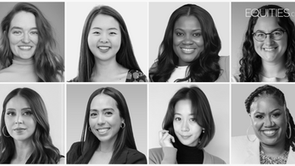How Caitie Corradino Is Paving the Way for the Future of Body Positivity Through Healing and Empowerment
- Editorial
- Mar 20, 2024
- 7 min read
Updated: May 23, 2024
An Interview With Brooke Bohinc

Meet Caitie Corradino, the Founder of Full Soul Nutrition, a nutrition practice that integrates traditional counseling with somatic healing modalities such as breathwork, movement, and trauma-informed yoga.
Caitie’s personal experiences of battling an eating disorder heavily inform the work she does today. She has an intimate understanding of the complex challenges present in the midst of disordered eating and body image issues. Despite achieving recovery on paper in her late teens, Caitie’s struggles continued, masked by a facade of fitness and control. Her later discovery of the intuitive eating approach and somatic healing methods ultimately enabled her to reach full recovery, empowering her to embrace flexible, body-honoring habits. This personal evolution fuels her dedication to guiding clients through their unique recovery journeys. She places a heavy focus not just on clinical recovery but on cultivating a profound sense of psychological safety and joy in life.
We asked Caitie about the founding story behind Full Soul Nutrition, how her definition of success has evolved throughout her journey, and what’s next for her and her company.
Tell us the story behind your company’s founding. How and why did you start working on Full Soul Nutrition?
When I first started my nutrition practice, it was a brick and mortar private practice in Manhattan where I was doing very traditional clinical nutrition counseling and eating disorder treatment. Then, at night, I taught yoga, mediation, and fitness classes at local studios. So basically I was nutrition counseling/treating eating disorders during the day then “moonlighting” as a yoga and fitness instructor. My career looked pretty nice on the outside, but I felt dysregulated by the fact that I was compartmentalizing. I felt like I wasn’t serving my clients in the best way I could. I wanted to integrate movement, breathwork, and embodiment into my nutrition counseling sessions. I knew that combining these things with meal planning could help my clients truly, fully recover from disordered eating and body image issues. I was seeing so many clients get to a place where they were “functionally” recovered from disordered eating, but they were still struggling to have a relationship with exercise and other “wellness” based activities without getting obsessed or burning out.
I reinvented my practice to integrate everything I do into one service because I wanted people to not only release their eating disorder but also live a life where they felt confident about eating well and working out without sliding back into the disorder. I started combining nutrition counseling with a toolkit of somatic healing modalities to help my clients with food, embodiment, and self-confidence. This way, they could not only “functionally” recover from disordered eating, but they could also find a way to pursue health and well-being that is sustainable and not another eating disorder “in disguise.” My “Full Soul Nutrition” method helps people break free from binge eating, food anxiety, body dysmorphia, and more. And now, I don’t only offer one-on-one counseling in an office; I also offer one-on-one counseling services remotely for people all over the world.
In what ways has your upbringing or past experiences contributed to how you operate as an entrepreneur?
My experiences have led me to the work I do today. I am no stranger to disordered eating, yo-yo dieting, and the soul-sucking pursuit of the "ideal" body. Growing up, I was an anxious kid and a dancer—a combo that led me to develop a clinical eating disorder in my early teens. Although I received some treatment and was deemed clinically "recovered" by age 18, I continued to struggle with food and my body. During college, I transitioned from being a dancer to a fitness instructor. Ironically, my transition into a "health" related hobby didn't support my health very much. Throughout college and grad school, I drowned in the toxic, physique-focused side of the fitness industry. I also swung between restrictive diets, detoxes, binging, and feeling out of control with food. During this time, I felt alone and ashamed. People in my life assumed I'd been recovered from my eating disorder since high school. But I was stuck in an insidious, invisible internal battle. On the outside, I had life "together." On the inside, my body was breaking down and my mind was totally preoccupied by the fear of what might happen if I stopped micromanaging my food intake and body shape.
One day, while I was writing a research paper for a psychology class, I stumbled upon the intuitive eating approach to nutrition. This marked a major turning point. The intuitive eating framework instantly made sense to me. From there, I was gradually led to the resources, tools, mentors, and grace I needed to completely break free from food and body anxiety. I let go of the pursuit of “control” over food and my body. I found flexible ways to feel good. I learned to implement habits that honor my body's unique, ever-changing needs. And through breathwork, yoga, and other somatic healing modalities, I healed deeper wounds and cultivated a sense of internal safety that I needed to release food and body obsession. This gave me the capacity to start working out without exhausting my body, eating well without depriving my soul, and creating energizing routines that gave me more life.
As I counsel clients today, I operate from my own understanding that full recovery from an eating disorder is possible and that it’s a personalized, nuanced journey. It’s not just about medical markers, an absence of symptoms, or “not dieting” anymore. It’s about feeling a deep sense of psychological safety and finding ways to care for your body that allow you to feel “better than fine,” and experience the fun, beauty, fullness, and deliciousness of life.

What’s one thing you wish you had known before starting Full Soul Nutrition?
I wish someone had told me that the nature of being an entrepreneur is consistently betting on yourself, leaping into unknowns, and cultivating an increasingly better relationship with risk and fear. Even if you’re starting a “straightforward” service-based business, any type of business venture will require you to consistently nurture your nervous system, your sense of internal safety, and your sense of self-confidence. I wish someone had told me that a successful business is not about staying out of debt. Your finances will need to rise and fall in any type of business because investments are required. And in order to feel regulated amid this type of uncertainty, you need to be committed to your well-being. Continually working on yourself through therapy and dedicating yourself to your own wellness practices is a really important business strategy.
Have you struggled with self-doubt as an entrepreneur? How do you navigate this?
Of course. It’s a natural part of our human biology and psychology, especially when you are doing something as risky as starting your own business. I’ve navigated self-doubt as an entrepreneur by accepting that it is only natural to feel it. So instead of trying to eliminate self-doubt or expecting it to go away, I’ve learned to change my relationship with it. I gently hold my self-doubt. I give it the microphone for a moment but never the driver’s seat. Elizabeth Gilbert, my favorite author, writes, “Your fear will be triggered by your creativity, because creativity asks you to enter into realms of uncertain outcome, and fear hates uncertain outcome.” From this I’ve learned to accept that fear is always going to be in the car. Just don’t let it drive.
As I counsel clients, I operate from my own understanding that full recovery from an eating disorder is possible and that it’s a personalized, nuanced journey.
Has your definition of success evolved throughout your journey as a founder?
I started my entrepreneurial journey in my early 20s, and, as was developmentally normal, I cared a lot about being “liked.” I associated success with popularity, number of followers, and approval from certain people in my field. But over a decade of serving clients and evolving my business, I’ve come to understand that success is about helping people. Success is in one-on-one interactions when I witness a client reclaim their brainspace and their life from disordered eating or body preoccupation. Success is in small groups where I see people being reminded of their inherent value, resilience, and uniqueness. With that, I’ve realized an important part of success is being willing to not be liked or understood by everyone. I take a pretty unconventional approach to eating disorder treatment that perhaps some people might not understand or celebrate. But I’ve realized that withholding my unique approach for the sake of being understood by everyone is ultimately unkind. I am being kinder, and ultimately more successful, if I am willing to offer a new, edgy way of supporting clients in eating disorder recovery. I don’t share my approach for the sake of stirring controversy but for the sake of offering something that people might need to finally heal.
What resources or people have contributed the most to your successes?’
One of the greatest privileges I’ve ever been given was access to the resources, tools, and mentors that I needed to recover from my own eating disorder. Just a few of the amazing dietitians and educators who helped me fully recover, discover the intuitive eating approach to nutrition, and realize the importance of embodiment as a healing tool are Evelyn Tribole and Elyse Resch, Christy Harrison, Jessi Haggerty, Brianna Campos, the entire team of teachers at The Class by Taryn Toomey, and Hilary McBride.
What would you tell your younger self if you were to start your entrepreneurial journey all over again?
I would tell my younger self to take time to “arrive” in every phase of the entrepreneurial journey. I think it’s really common to get caught up in the idea that fulfillment is going to come at some point in the future. But the truth is that your continued success requires that you take time to “land” and relax along the way. There is no arbitrary point in the future where you’re going to feel like you deserve to rest. Nourish yourself along the way. Take a rest now.

What’s next for you and Full Soul Nutrition?
I am going to start focusing more on leading retreats. My first “Nutrition and Intuition” retreat is coming up this March. I see a major gap in the retreat market. There are so many well-intentioned wellness retreats that come with so many benefits, but that completely miss the mark when it comes to body image and relationship with food. I have been on multiple, amazing retreats and find that body image always comes up. Many women admit that they can't stop thinking about their body shape and size. Many women share their desire to feel more comfortable in their skin. And there's always at least a few chronic dieters who say something like, “We shouldn't be eating rice!” at the dinner table. I want to create more retreats where we don’t let food anxiety and body image be the elephant in the room and we don’t just create an incubator to drink smoothies and practice yoga for seven days in a way that we’d never be able to maintain in the real world. I want to create more retreats where we practice simple, sustainable self-care that guides women to true health and happiness while addressing body image.










